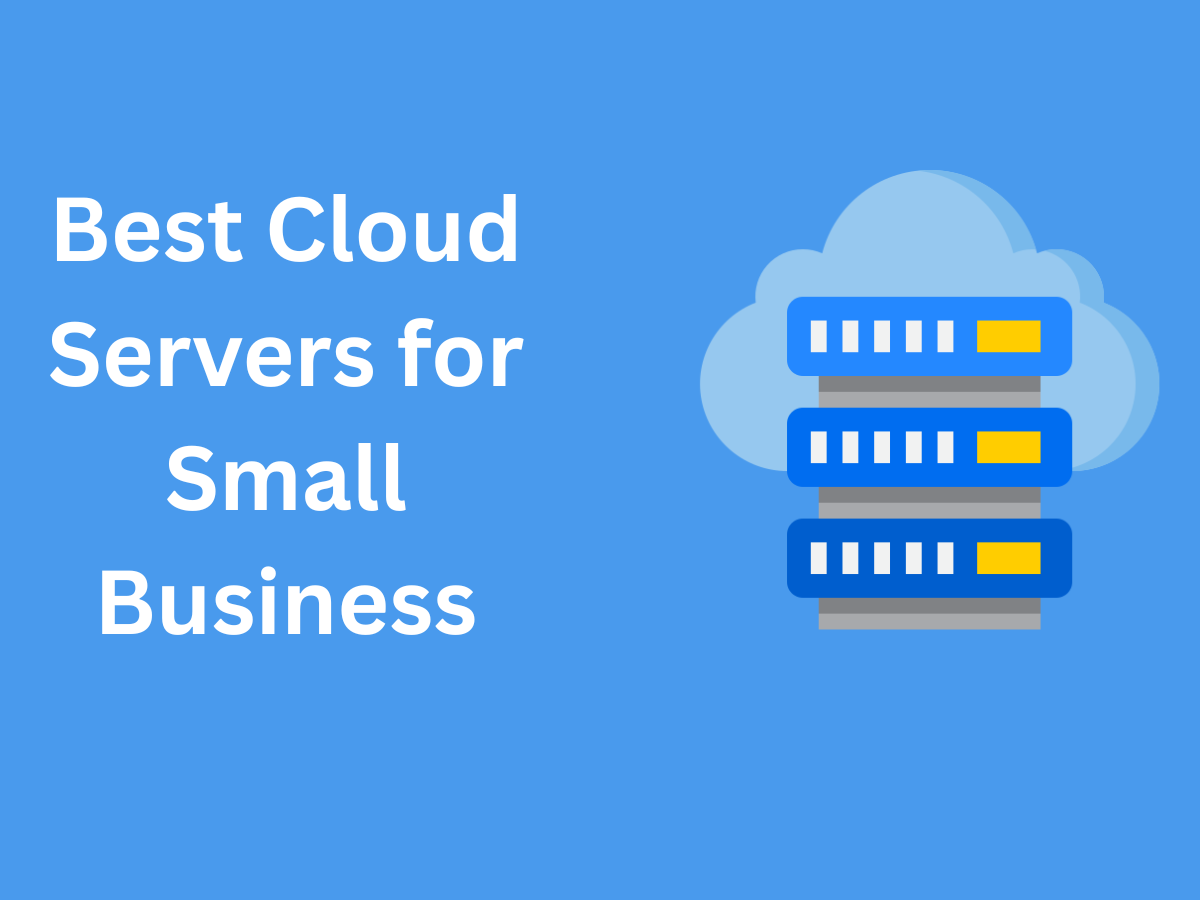Small businesses must choose a proper cloud server when looking for smooth operations, flexibility, and potential growth. When a cloud hosting service is good, it can grow with your business, stay online most of the time, and be secure and affordable. Depending on a business’s size and what it requires from its servers, options are available from basic to adaptable ones for developing companies. You should check if the hosting offers simple setup, 24/7 help, automatic backups, and support for big traffic. Choosing the Best Cloud Servers for Small business means combining affordability and good performance, so small businesses do not have to use all their funds on a website.
What does a Cloud Server mean?
A cloud server is an online server that provides things such as storage, processing speed, and networking through the internet. Unlike traditional servers that are kept in-house, cloud servers are housed in data centers and accessed from wherever, making them convenient and easily scalable. Thanks to them, both businesses and individuals can use websites, apps, or databases without buying or choosing hardware. Demand can change the cloud server capacity, which makes them both efficient and cost-effective. Many businesses use cloud servers because they are secure, reliable, and usually operational all the time.
The differences between Conventional and Cloud Servers
The traditional type of servers is provided by physical devices that are set up either off-site or on-site, which need to be bought, cared for, and managed by staff from the start. They provide a specified amount of resources and are unable to grow much. From another point of view, cloud servers do not have physical presence and are remotely accessible from the internet. They give you access to resources on demand, and you are billed only for what you use. Cloud servers make it quick to add capacity, provide remote access, and ensure reliability because extra resources are available. Even though dedicated servers provide better control for certain security reasons, choosing a cloud server is cheaper, offers flexibility, and is useful for companies that want to be agile and less complicated to manage.
Cloud service types
Most cloud services are often placed into these three categories: Infrastructure as a Service (IaaS), Platform as a Service (PaaS), and Software as a Service (SaaS). IaaS enables users to find and hire servers, storage, and networking solutions on the internet. In PaaS, you get an environment with the necessary tools to build, run tests on, and deploy applications without handling hardware. There is no need to install anything when you use SaaS, since your applications are available on the web through browsers like email or CRM. Thanks to these models, businesses can manage their services according to what they require and how much they’re able to spend.
Cloud servers provide these major benefits to small businesses.
Cost Efficiency
Because no costly setup is needed and maintenance is easy, cloud servers are a cost-effective solution that lowers IT expenses.
Scalability
You only use and pay for resources that fit your needs at any moment, since you can change the quantity as necessary.
Accessibility
Since cloud servers allow users to connect remotely, teams can easily communicate and carry out their work without being together.
Reliability
Thanks to their stability, cloud servers ensure good performance all the time.
Security
Methods such as encryption, firewalls, and regular IT backups protect a company’s information from cyber dangers.
Top 10 Best Cloud Servers for Small Business
1. Hostinger
Because of its low cost and scalability, Hostinger’s cloud server makes a great choice for small businesses. With CPU, RAM, and SSD storage, your website can operate quickly and efficiently all the time. Even people without technical knowledge can use the control panel to manage their servers. The company takes steps to keep your site safe from DDoS attacks and also provides automatic backups to secure your information. Because the plans are flexible and customers receive support around the clock, Hostinger cloud servers offer dependable performance at a cost that startups and small businesses can afford.
2. Amazon Web Services
Amazon Web Services refers to a collection of cloud computing services by Amazon.AWS is a top cloud provider, giving customers a wide range of services such as computing, storage, databases, and machine learning that can be scaled. Because AWS is trusted by companies of various sizes, it makes it possible for them to save costs and expand fast, using resources only when they need them. Thanks to its data centers around the world, the network stays active and offers quick responses. The services on AWS help manage different applications, simple or complicated, and include advanced security and various compliance options for enterprises. Thanks to the wide range of tools and services available on AWS, businesses can come up with new ideas, work more efficiently, and grow without handling infrastructure.
3. Google Cloud Platform
With Google Cloud Platform (GCP), businesses can quickly develop, set up, and scale their applications using Google’s strong infrastructure. It is famous for delivering high performance, good security, and being worldwide, and its solutions include virtual machines, data storage, machine learning, data analytics, and a Kubernetes-based container-management system. With the help of different clouds, it helps developers can adjust quickly and enjoy a smooth experience. GCP’s tools are made for people working in the cloud who focus on getting incredible scalability, high reliability, and cost savings. Because of its advanced cybersecurity, artificial intelligence, and easy-to-use interface, Google Cloud allows companies to become more innovative and work more efficiently in multiple data centers all around the world.
4. Digital Ocean
Thanks to its simple setup, low prices, and comfortable environment for developers, DigitalOcean is a well-known cloud infrastructure provider. It provides sizable virtual servers, Droplets, which you can use for website, application, and development platform hosting. Since DigitalOcean offers clear prices, SSD storage, and great reliability, it is frequently used by startups and small businesses. Easy management of containers, databases, and networks is possible on its platform, along with a range of applications obtained from the marketplace. Many developers like that its interface is clean, its API is powerful, and there is a lot of helpful documentation. With DigitalOcean, you can rely on good network speeds, simple controls, and affordability, so businesses don’t have to worry about the setup procedure.
5. HostGator
HostGator provides cloud server hosting that allows small businesses to perform well and grow easily. Cloud servers make use of many different servers at the same time, so this allows them to balance the load and minimize both slow-loading websites and downtime. Thanks to an easy-to-use dashboard, users can watch their performance and change the CPU and RAM as needed. Some of the features HostGator offers are automated failover, included caching, and a free migration process for websites. Since HostGator promises 24-hour support and high site availability, its cloud hosting is a budget-friendly choice for expanding companies to use on their websites and internet applications.
6. IBM Cloud
Among its range of services, IBM Cloud has virtual servers, containers, AI features, and capabilities in data analytics. Thanks to its cloud servers, companies of any size have a safe and easily expandable technology. Being able to hybrid and multi-cloud, IBM Cloud helps companies that require advanced IT solutions. With the help of integration, users can run their workloads using virtual machines, Kubernetes, or the serverless option. For this reason, IBM is widely trusted by companies operating in regulated sectors because it prioritizes data privacy, litigation, and security. Because it is available worldwide and offers features used by big companies, IBM Cloud is a solid choice for servers.
7. Oracle Cloud
Oracle Cloud gives customers the advantage of strong cloud computing by paying attention to performance, security, and high-quality infrastructure. Virtual machines and bare-metal servers in Oracle Cloud Infrastructure (OCI) allow developers to help support their application, database, and development projects. Those companies that use Oracle software for databases and ERP will find that Oracle Cloud provides the needed performance. Among its capabilities, it provides flexible cloud combinations, automatic scaling, tough security measures, and servers in many locations. Since it is both affordable and well supported, Oracle Cloud suits businesses that aim for consistent top performance in the cloud.
8. Alibaba Cloud
Alibaba Cloud is renowned in Asia for its cloud server services that can be adapted to businesses of all sizes. ECS by AWS allows you to pick the right virtual server by setting its CPU, memory, and storage requirements according to your needs. Due to its strong presence in rising markets, Alibaba Cloud drives international growth by setting up data centers in various places. It ensures your website is safe, grows with traffic, and works well with big data, AI, and machine learning resources. Thanks to its low prices and multilingual support, Alibaba Cloud suits businesses looking for a high-performance cloud system, mainly when they aim for markets in the Asia-Pacific or need to operate digitally across borders.
9. Microsoft Azure
Microsoft Azure provides cloud services covering many different needs, with secure cloud servers for businesses everywhere. With Windows and Linux on its virtual machines, users find it simple to install applications, host their websites, and conduct work using enterprise systems. Since Azure works smoothly with Microsoft products, it is ideal for companies that are Microsoft users. Important aspects are keeping the service always available, locations in different parts of the world, including security, and additional services such as AI, analytics, and DevOps tools. Because of its flexible pricing and good support for businesses, Azure is a solid pick for companies wanting to use cloud servers.
10. Bluehost
Small businesses can benefit from Bluehost’s cloud servers, which are dependable, scalable, and easy to handle. Using a combination of dedicated and shared hosting resources, the cloud servers make websites load at a better speed and keep them operational for longer periods. You improve the way websites respond to sudden changes in traffic without affecting their quality. Bluehost offers users a simple control center, SSL certificates at no cost, and better security. Because of 24/7 support and seamless compatibility with WordPress, Bluehost cloud hosting works well for businesses wanting a stress-free and speedy cloud server.
Things to Consider When Opting for a Cloud Server
Small businesses should take a few points into account when deciding on a cloud server. Being scalable means a site can manage sudden increases in traffic and visitors without any problems. It helps to pick an engine that is clear about costs and allows you to pay according to your use. Factors such as SSD, powerful CPUs, and promised uptime play a major role in how well users use the web hosting service. With various security features such as encryption, backups, and DDoS protection, important data is defended. A dashboard that is easy to understand and customer support that works well are valuable to teams who are not tech experts. Remember to check how the software can be combined with other tools to help you operate more efficiently.
Final Verdict: Best Cloud Servers for Small Business
Good cloud servers for small firms have good performance, an affordable rate, and are easy to handle. When deciding on a provider, choose one that has scalability, always high availability, top-quality security, and excellent customer service. Businesses that do not have much technical support greatly need interfaces that are easy to use and pricing that suits them. Look at plans that can be adjusted as your needs grow and give automatic tools for saving data, monitoring your system, and keeping things updated. Selecting the right cloud server will boost the speed of your website, let employees work remotely, and reduce expenses for your business’s IT, helping your company perform well and grow.









